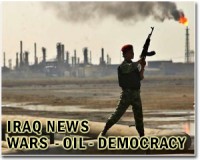 |
Baghdad (UPI) Dec 23, 2010 Iran's "Special Groups," Tehran's paramilitary proxies in Iraq, are likely to flourish under the new Shiite-dominated coalition government being formed by Prime Minister Nouri al-Maliki, Iran's choice to rule in Baghdad. Maliki, a Shiite who has a long history of working with Tehran, has named himself acting minister of defense, interior and national security, three most powerful and sensitive posts in the government he is stitching together. Although Maliki appears to be bending over backward to accommodate rivals among Iraq's Shiite majority as well as minority Sunnis and Kurds in his administration in a spirit of reconciliation, he is unlikely to relinquish those ministries that dominate the security sector. During his first mandate following his election in 2006, Maliki steadily amassed control of all security forces, often through stealth, to ensure his power. Despite the political necessity of giving his rivals some senior posts in the interests of national unity, he is unlikely to soften his dictatorial instincts. Maliki may pursue a more nationalistic course than Tehran would like, but the Special Groups, controlled by Iran's elite Islamic Revolutionary Guards Corps, have in recent years demonstrated their ability to destabilize Iraq and hasten a U.S. withdrawal. The Special Groups were set up by Tehran through the Guards' al-Quds Force following the U.S.-led invasion of March 2003 that toppled Saddam Hussein, Iran's longtime nemesis. The Quds Force, which conducts all covert operations outside Iran, has been operating inside Iraq more or less since 1979. The Special Groups' mission was to attack U.S. forces and their allies, and conduct covert operations to further Iranian influence, and eventually control, post-Saddam Iraq. They were arguably more dangerous for the Americans and their Iraqi allies than al-Qaida. "As well as seeking to hasten the U.S. withdrawal, the Special Groups demonstrate Iran's ability to destabilize Iraq and may be used to pressure a future government into reducing the long-term presence of U.S. forces in the country," says U.S. analyst Michael Knights. "More broadly, the Special Groups represent a flexible tool that might be used to aid Iran's effort to prevent nationalist and former Baathists from rising to the top of Iraqi politics and to maintain leverage over a new Shiite-led government," Knights wrote in the journal of the Combating Terrorism Center at West Point. These military cells -- armed, funded and trained by the Quds Force -- are spread across Iraq's political spectrum, from totally clandestine groups to political parties with deniable links to the Guards. These groups include: -- Ketaeb Hezbollah: KH was formed in early 2007 with the Quds Force's most reliable operatives and most sensitive equipment. Its current strength is around 400 fighters. It is led by an Iraqi, Abu Mahdi al-Muhandis, real name Jamal al-Ibrahim, a veteran Iranian-controlled terrorist who is also an adviser to al-Quds' shadowy commander, Brig. Gen. Qassem Suleimani. In the 1980s, when Iran waged a covert war against Saddam's regime, al-Muhandis belonged to the extremist Iranian-backed ad-Dawa Party, of which Maliki was and remains a key member. -- Asaib Ahl al-Haq: AAH emerged in 2006 along the lines of Lebanon's Hezbollah, Iran's most successful proxy in the Arab world. The organization was built around Qais al-Khazali, formerly with the Mehdi Army militia led by firebrand Shiite cleric Moqtada Sadr. Khazali and veteran Lebanese Hezbollah operative Ali Musa Daqduq were captured after killing five U.S. soldiers, but later released under a prisoner exchange. Knights says notorious Special Group commanders such as Abu Mustapha al-Sheibani and Abu Deraa, who had fled to Iran, are returning to work with AAH. -- Promised Day Brigades: The PBD is generally viewed as a Shiite nationalist group linked to the Mehdi Army but operating against U.S. forces without the political constraints that have neutered Sadr's organization. Knights, of the Washington Institute for Near East Policy, believes "many elements of PDB, AAH and KH will probably be drawn into the security forces." While Americans are likely to become targets, "sectarian utilization of the Special Groups to target Sunni nationalist oppositionists could become a problem once again," Knights observed. "If Iraqi government policy crosses any 'red lines' (such as a long-term U.S. military presence in Iraq, rapid rearmament or anti-Iranian oil policy), the Special Groups could be turned against the Iraqi state in service of Iranian interests."
Share This Article With Planet Earth
Related Links Iraq: The first technology war of the 21st century
 Iraqi army builds up first tank division
Iraqi army builds up first tank divisionBaghdad (UPI) Dec 21, 2010 The new Iraqi army has started building up its armored forces with the first batch of 140 U.S.-built M1A1 Abrams main battle tank, the same type that crushed Saddam Hussein's military in March 2003. The 9th Armored Division, based near Baghdad, will be the spearhead of an army that will likely have a strength of more than 300,000 troops in up to 20 divisions, six of them armored. ... read more |
|
| The content herein, unless otherwise known to be public domain, are Copyright 1995-2010 - SpaceDaily. AFP and UPI Wire Stories are copyright Agence France-Presse and United Press International. ESA Portal Reports are copyright European Space Agency. All NASA sourced material is public domain. Additional copyrights may apply in whole or part to other bona fide parties. Advertising does not imply endorsement,agreement or approval of any opinions, statements or information provided by SpaceDaily on any Web page published or hosted by SpaceDaily. Privacy Statement |